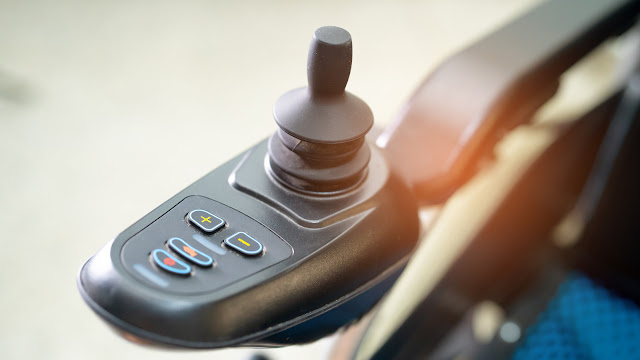The U.S. is making development farfar from the restrictions of proprietary restore offerings and in the direction of fairer legal guidelines that now no longer handiest make third-celebration restore less complicated however additionally acceptable. Adding to this development, the nation of New York these days surpassed the "Fair Repair Act" invoice that compels all "virtual digital products" producers to uphold the proper to restore and make spares to be had so human beings can restore their devices themselves. In line with the proper to restore client electronics, any other motion for fairer restore rules is beginning to form up, and it worries mobility cars consisting of powered wheelchairs for the disabled.
According to the World Health Organization (WHO), nearly a billion human beings (or 15% of the world`s population) be afflicted by disabilities. Out of those human beings, approximately 3 million people withinside the U.S. rely upon wheelchairs for his or her every day routines. This requirement provides a giant chew to the American Durable Medical Equipment industry, that is already really well worth extra than $fifty six billion as according to Grand View Research. A massive percent of those human beings with disabilities use electronically-powered wheelchairs and are pressured to rely upon first-celebration maintenance, which can be time-consuming, costly, and might depart them stranded with out a essential device for days, even withinside the case of honest maintenance.
New regulation to mission DRM restrictions
To ease this painful and difficult method, a invoice has been surpassed withinside the Colorado State General Assembly, and the cause at the back of the invoice is to consist of powered wheelchairs withinside the proper-to-restore motion. The invoice is subsidized via way of means of Representatives Brianna Titone and David Ortiz and Senators Rachel Zenzinger and John Cooke.
The invoice, as soon as accepted via way of means of Gov. Jared Polis, will compel producers "to offer components, embedded software, firmware, equipment, or documentation, consisting of diagnostic, maintenance, or restore manuals, diagrams, or comparable information, to impartial restore companies and proprietors of the producer's powered wheelchairs to permit an impartial restore issuer or proprietor to behavior diagnostic, maintenance, or restore offerings at the proprietor's powered wheelchair."
With this resolution, the lawmakers backing it desire to impede barriers that save you or put off the method of having powered wheelchairs repaired. One such hindrance is Digital Rights Management (DRM), which can be virtual safeguards that discourage customers from changing components themselves.
How DRM limits maintenance
DRM is blanketed beneathneath the Digital Millenium Copyright Act (DMCA), which restricts copyrighted cloth from getting used towards the desire of its proprietor. As according to the Electronic Frontier Foundation (EFF), the DMCA additionally states that the usage of a device to skip "get entry to control" can bring about criminal costs with as much as 5 years of a jail sentence or $500,000 in fine. For any individual, not to mention a person with a disability, that sum is widespread sufficient to discourage them from seeking to restore their personal electronics.
For powered wheelchairs, DRM can save you customers from getting faults checked via way of means of impartial technicians or making modifications for preventative care or maintenance, consisting of changing a defective wheel or upgrading the motor. EFF additionally notes that get entry to to defective digital structures in a powered wheelchair is managed via way of means of "cryptographic protection dongles" that incorporate passwords and diagnostic equipment to get entry to such structures. Besides restore, DRM additionally restricts customers from getting access to controls that fine-song the running in their wheelchairs.
Hassles the brand new Colorado regulation pursuits to avert
The largest motive powered wheelchair customers need the proper to restore is the excessive fee of maintenance. As according to the EFF, the logo Numotion charged a user $three hundred for changing a unmarried tire that in any other case costs $6 on Amazon. Company technicians additionally reportedly refused to update the tire because of DRM restrictions. In any other instance, Numotion reportedly quoted one user $500 for the button that allowed them to energy the wheelchair, and the alternative took 4 months. In contrast, the equal button on eBay fee the user $20.
Additionally, maintenance have restrained insurance beneathneath scientific coverage. Public Interest Research Group (PIRG) notes that for customers beneathneath Medicare and Medicaid programs, handiest maintenance via way of means of the producer qualify for reimbursement. Even after that, the coverage application handiest will pay for the components modified and the hard work costs however now no longer for the time taken via way of means of the technician's go to to examine, choose up, or go back the wheelchair. Meanwhile, non-public insurers make customers wait till the charges are accepted and paid back.
These practices purpose unreasonable put off and majorly have an effect on individuals who depend upon powered wheelchairs for recurring activities. While Colorado's proposed regulation does now no longer skip the duopoly withinside the powered wheelchair marketplace withinside the U.S., it offers customers clean get entry to to components for alternative and the guarantee of leaning on their relied on technicians to restore their wheelchairs with out being conned or overcharged.







0 Comments